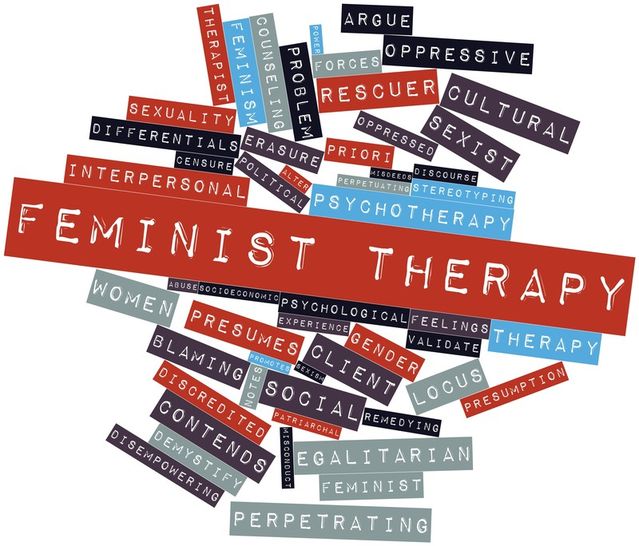Self-Esteem
Suffer from Low Self-Esteem? Consider a Feminist Therapist
Feminist-informed approaches to therapy are excellent for boosting self-esteem.
Posted March 16, 2016

A very common reason clients begin psychotherapy is to improve low self-esteem. While low self-esteem isn’t in mental health providers’ diagnostic “bible” of mental disorders (called the DSM-5), self-esteem issues can wreak havoc in multiple domains of a person’s life and are connected to a variety of other conditions such as anxiety, depression, and posttraumatic stress disorder. And while men sometimes suffer from low self-esteem, this affliction disproportionately affects women.
So what do you do if you’re suffering from low self-esteem?
The short answer is to seek professional help, but keep in mind that not all therapists are alike, and there are many theoretical orientations from which mental health providers work. Here’s a somewhat more specific answer: Consider a feminist therapist.
What is a Feminist Therapy?
Feminist therapy is a bit difficult to define because it does not prescribe specific methods be used, and it does not have a single founder or champion. Rather, feminist therapy is based on a core set of feminist values and adheres to four main tenets. Specific methods and techniques, in turn, are derived from these feminist assumptions.
Core Values of Feminist Therapy
Feminist therapy is based on the following values (Rawlings & Carter, 1977):
- Pathology is conceptualized as social and external, as opposed to personal and internal. Thus, women’s low self-esteem is believed to be driven by past (and often current) oppression and repeated disempowering experiences.
- The assumption that pathology is externally-based does not exonerate the client from responsibility. While the cause of the pathology may be largely external, the solutions, and resulting individual and social change, begin from within.
- Rather than encouraging women to simply adjust to social conditions, usually by modifying themselves, the focus is on social and political change. This shift toward social change can be a difficult one, as women are frequently taught to accommodate others and to modify themselves.
- Other women are not the enemy, and neither are men. Rather, an oppressive, patriarchal system is assumed to be the catalyst for many of society’s problems, as well as for several mental health issues.
- Women should work to become psychologically and economically independent. This helps women to become more empowered and to avoid becoming trapped in coercive or abusive relationships.
- Relationships should be equal in personal power. The minimization of relationship power differentials reduces women’s chances of being mistreated, manipulated, or coerced.
- Rigid gender roles should be challenged and eliminated. Instead of blindly adopting traditional gender roles, women are encouraged to actively define their roles and to design their lives in a way that fits with their own personal values.
Core Tenets of Feminist Therapy
In addition to the values described above, feminist therapists tend to adhere to the following core tenets of feminist therapy (Worell & Remer, 2003):
- Privileging women’s experiences: Historically, psychological theory and professional practice has centered on men’s lived experiences and realities, while women’s experiences have been largely marginalized. To privilege women’s experiences the feminist therapist considers both women’s and men’s experiences equally, and the commonality of women’s experiences is validated (Sturdivant, 1980).
- Egalitarian relationships: The creation of a completely equal relationship between mental health providers and clients is not believed to be possible, however, in feminist therapy the inherent power differential is minimized and treatment planning is collaborative. Power differential reduction can be accomplished through the identification of therapist and client roles and responsibilities, therapist transparency regarding methods used and what they intend to accomplish, and the assumption that the client is the expert on themselves, while the therapist is the expert on psychotherapeutic approaches (Brown & Brodsky, 1992).
- Personal is Political: During the self-reflective and consciousness-raising Women’s Movement groups of the 1960s, it was discovered that many women experienced similar problems and symptoms. These women had previously assumed their issues to be unique, but these groups revealed certain women’s issues to be common, and strongly influenced by the social and political context in which women live (Morgan, 1970).
- Empowerment: Empowering women to actively make positive changes is a central tenet of feminist therapy because it helps to address the myriad of problems created as a result of women’s subjugation, limited power, and maltreatment (such as sexual harassment and sexual assault). The result of empowerment is that women become able to identify and use their own strengths, and to facilitate individual, social, and perhaps even political change.
Given all of this, how exactly can feminist therapy improve self-esteem?
Self-esteem is defined as “confidence in one’s own judgment, abilities, power, etc.” Those who experience low self-esteem often have difficulty making decisions, excessively worry about what others think, doubt their abilities and potential for success, experience disempowerment, and/or often feel as though they are not as good as others. Feminist therapy can help with these issues in a variety of ways!
First, feminist therapists can help clients to better balance responsibility and power in their lives, whether it be by reducing responsibility for things out of the client’s control (which leads to feelings of anxiety and helplessness) or increasing the power the client experiences by emphasizing natural strengths and encouraging assertiveness and positive action (whether it be individual, social, or political). Also, by focusing on clients’ strengths and helping them step out of their comfort zone to take small, manageable risks, clients can begin to experience small successes and moments of increased confidence. Through empowerment-building exercises such as these and others, clients can grow to fully enjoy the courage and strength they have always possessed, become more decisive and independent, and trust in their ability to handle difficulties that come their way. These shifts allow clients to become proactive instead of reactive, hopeful instead of hopeless, and empowered instead of disempowered. They can also bring the client’s own voice to the forefront of decision-making so that decisions are no longer fear-based, but value-based.
If you believe a feminist therapist might be helpful for your low self-esteem, one option is to peruse Psychology Today and contact a mental health provider who specializes in self-esteem issues. When first speaking with them, inquire about their “therapeutic orientation” (which is essentially the therapist’s beliefs about how mental health issues develop and how to best resolve them), and ask whether they utilize feminist principles in their work. Also, remember that the most important factors when choosing a therapist are whether you can really connect with and open up to them. Choose someone who is a good fit for YOU. In doing this, you’ll have taken the first step toward self-empowerment!


